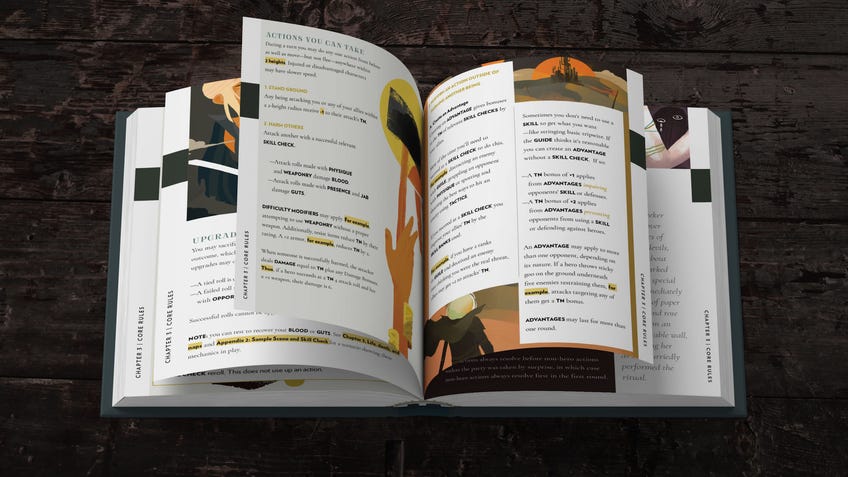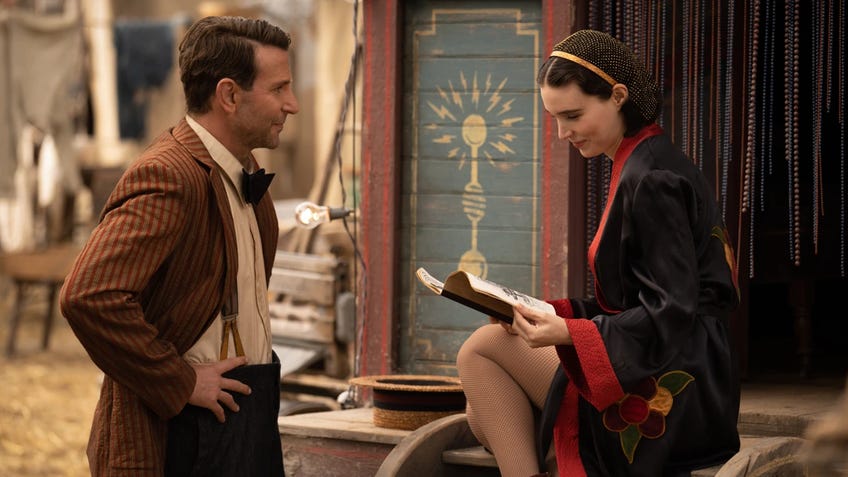Nightmare Alley and tragic tabletop RPGs prove that knowing the end of a story doesn’t ruin it
Doomed but not out.
Nightmare Alley is the latest film by Guillermo del Toro, the director behind such weird and wonderful movies as The Shape of Water, Pan’s Labyrinth and Crimson Peak. Based on the 1946 novel by William Lindsey and a remake of its 1947 film adaptation, Nightmare Alley takes a lot of inspiration from the noir genre – the term used to describe many 1940s and ‘50s films that focused on a protagonist with a dark backstory and an even darker future. Though the audience doesn’t know exactly what is going to happen to Nightmare Alley’s Stan Carlisle – there are no flashforwards – the film gives plenty of hints that things are not going to end well for him.
For some viewers, the film’s signposting might result in a feeling of unsatisfaction once the credits roll and their suspicions have been confirmed. Being surprised by the various twists and turns of a story is one of the major draws of watching movies and entire marketing campaigns have been built upon the need to avoid major story spoilers – whether that’s Avengers: Endgame or the films of The Sixth Sense director M Night Shyamalan.
The same could be said for the stories told in tabletop roleplaying games. Much of the appeal of playing a tabletop RPG is not knowing where your character is going to go or what they’re going to do until you make those decisions. The common inclusion of dice-rolling gameplay mechanics in TRPGs only serve to increase the enticing mystery of their story, with even the players’ decisions not guaranteeing the outcome of an action. If the game master foreshadowed how your RPG character’s epic journey is going to end with them being crushed under the club of a giant, that might be enough to put you off playing their campaign.
However, foreshadowing can work in certain situations. There are many reasons as to why Macbeth is my favourite Shakespeare play - besides the hilarious Porter monologue and Lady M being an absolute #girlboss, the heavy foreshadowing that Macbeth is going to fail in his endeavour to take the throne of Scotland is one of them. The same goes for Nightmare Alley, a film with a doomed protagonist whose lack of hubris and unfortunate past clearly indicate that his ambitious schemes are going to end in failure. There was even a moment while watching the film where I immediately clocked onto exactly what was going to happen to Stan, thanks to something that had already happened to another character.
Part of the enjoyment of watching noir films is knowing that there is no happy ending in sight.
This all works because Nightmare Alley is a film about tragic fate. It’s not a coincidence that the plot revolves around a travelling carnival that features a tarot card reader. Noir movies are all about doomed protagonists and inescapable fate. Part of the enjoyment of watching noir films is knowing that there is no happy ending in sight and it's almost cathartic to witness something you’ve been waiting to happen.
There are several tabletop roleplaying games that play off this exact same appeal, revealing how their stories will end but leaving the journey up to the GM and their players.

An excellent example is Ten Candles by Stephen Dewey, which has its players collaboratively tell a tragic tale of a group of survivors who will not be alive by the end. The ten candles that players light at the beginning of their game each represent a chapter of their story, with the room gradually growing darker as the lights are extinguished – the final candle being blown out indicating the end of life as well as the game.
Going into Ten Candles knowing that your character is going to die doesn’t make the experience pointless – as some people might worry – but lends players a sense of freedom. Worrying about where characters are going to end up in the greater narrative doesn’t matter because Ten Candles is a game about catharsis more than anything else. Characters in Ten Candles are looking to achieve a sense of peace before they die, with players aiming to tie up their loose ends before the last candle is extinguished.
[Arc] forces you to think about how important the slow moments of life are once they’ve been snatched from you.
Though not as explicitly negative as Ten Candles, designer Momatoes’ Arc is another tabletop RPG that provides players with a specific ending point for their games by employing a doomsday clock that works in real-time. Player characters in Arc are facing a literal apocalypse, which they must attempt to stop before time runs out both in-game and in real life. Depending on the nature of the incoming apocalypse – and on how long the GM and players want to experience Arc for – there will be a specific amount of time the characters will have before the end arrives and the world is destroyed.
Though it’s not pre-decided whether the players will be able to save the world in time, Arc still provides a very clear endpoint for people to work toward. This means that by the time the game has hit its penultimate minute, players will probably know whether they’ve managed to achieve their mission or not. Once again, the point of playing Arc isn’t to unlock a particular ending but to experience a roleplaying game under a unique kind of pressure, one that forces you to think about how important the slow moments of life are once they’ve been snatched from you.
As with watching a noir film like Nightmare Alley, twists and endings shouldn’t necessarily be the only thing that drives our desire to play RPGs. The character moments and internal revelations we can experience through playing tabletop roleplaying games should be enough of a reason to pick one up.
Buy Ten Candles from the Cavalry Games website and Arc from the game's website.



